Turkey Intelligence Report
Period: November 13th, 2017 – November 27th, 2017
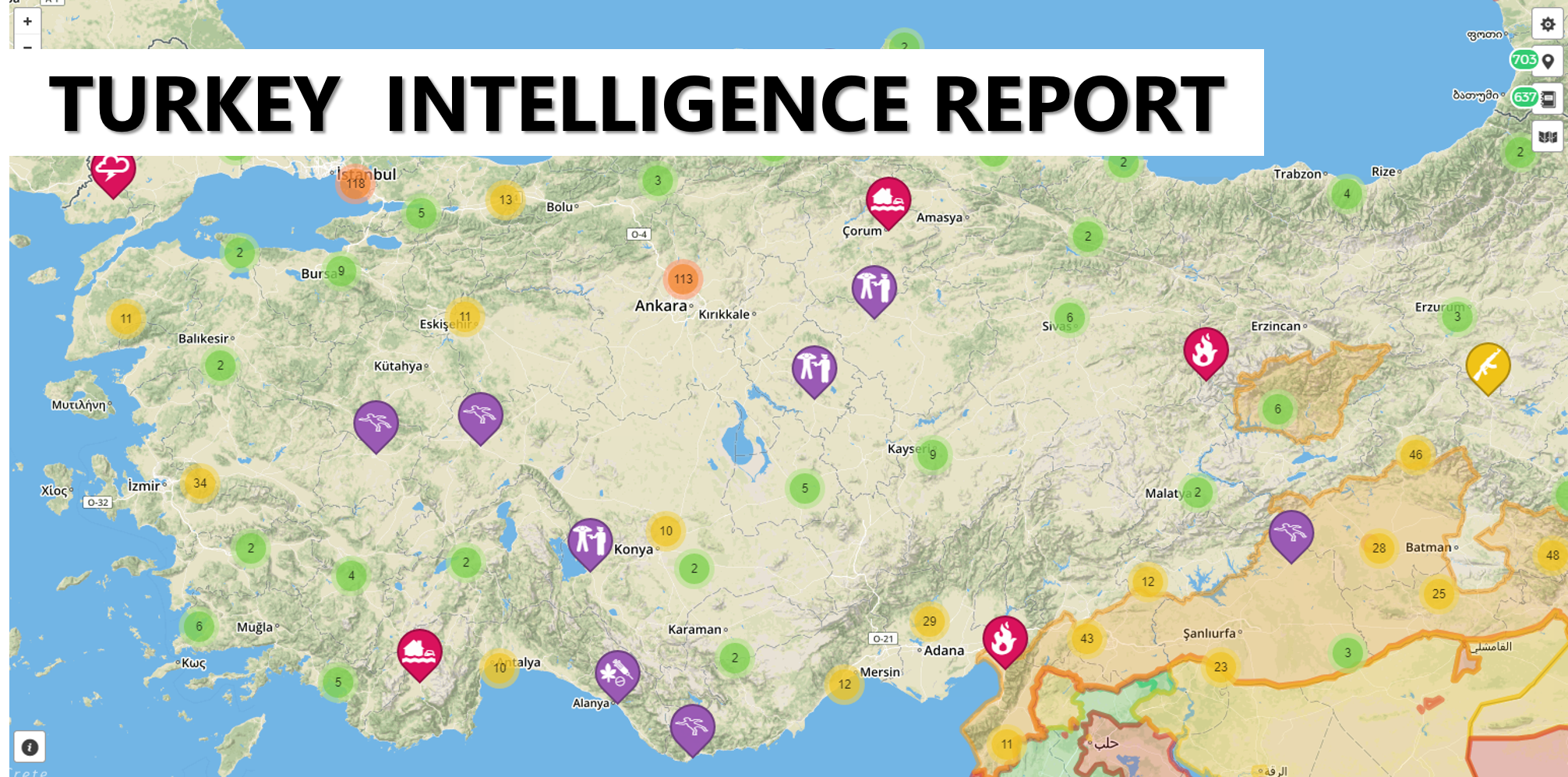
This report will present the major security incidents that occurred in Turkey from November 13th, 2017 – November 27th, 2017. The incidents are arranged in the following categories: Terrorism (Islamic State (IS), PKK/KCK, FETÃ, Extreme Left Organizations), Turkish Military Operation in Idlib/Syria, Foreign Affairs, Human Trafficking, Narcotics, and Armed Incidents.
Turkey Incidents – Country Wide Cluster View
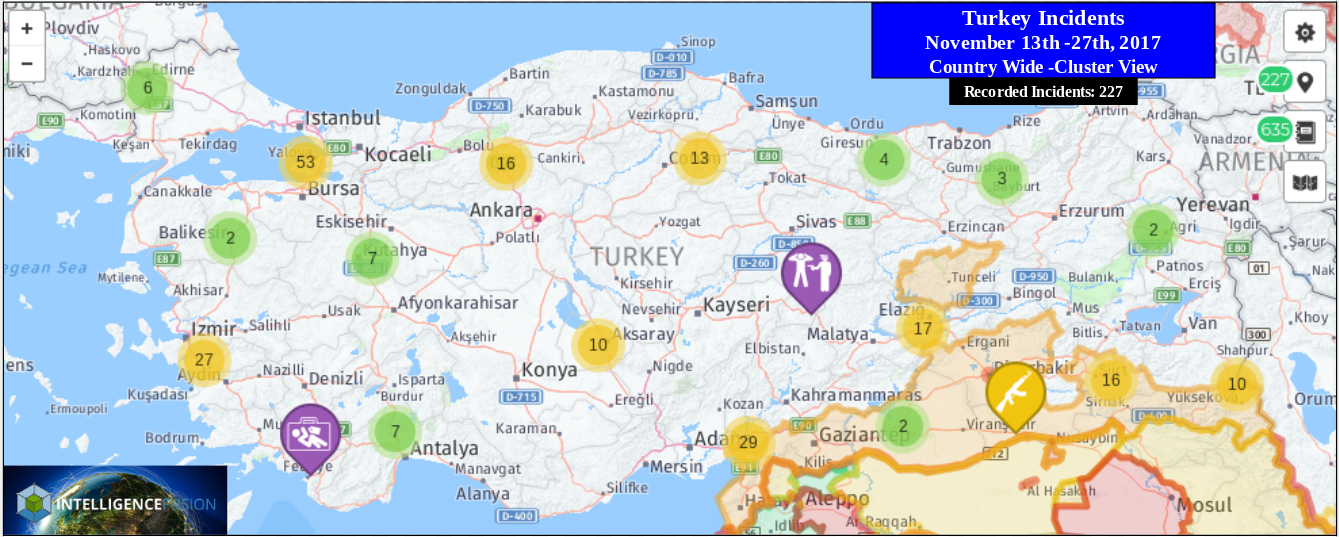
Key Findings
Turkish security authorities will further weaken due to the political persecution of specialized personnel in the police and military sectors.The improved Turkish-Syrian border security measures do not deter IS fighters from entering the country.Turkey – U.S./NATO relations will most likely deteriorate due to Turkeyâs multi-dimensional foreign policyHeroin trafficking in Turkey will most likely increase in the following months
Incidents – Country Wide
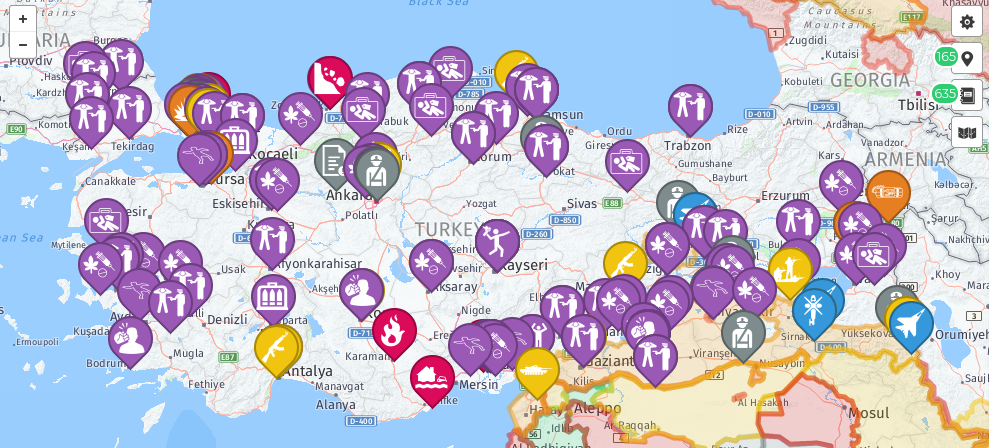
Summary
Turkeyâs domestic and external security remains problematic. Large scale police operations were carried out against IS suspects, PKK insurgents and hundreds of individuals were detained accused of having links with FETÃ throughout Turkey. The Turkish Army conducted extensive counter terrorism operations in the south eastern provinces assisted by air force strikes against PKK locations. Domestic security is degrading due to the uncontrolled weapons trafficking leading to a frequent use of firearms in everyday occasions and by the drug trafficking networks which are expected to increase their smuggling operations the following months. Turkeyâs turbulent relation with NATO and U.S. is used to politically justify Turkeyâs operations with Iran and Russia in Syria and sharpen even further the nationalist rhetoric of leading political figures against Turkeyâs western allies. Turkish troops continue to establish security posts and monitor towers in Idlib/Syria and more armored vehicles and soldiers have crossed the border into Syria and are now deployed across the Idlib – Afrin zone.
TERRORISM
Islamic State
Summary
The operations against the IS continued in the past two weeks but did not have the intensity of the operations conducted in October. Foreign nationals, Iraqi and Syrian, were detained during operations across Turkey with the most notable arrest being that of 15 IS suspects in Adana and 20 in Istanbul. In total 196 IS suspects were arrested. Concerns have been raised for IS militants entering Turkey following the evacuation of Raqqa, two such militants were responsible for masterminding previous terrorist attacks in Turkey.
Islamic State Incidents
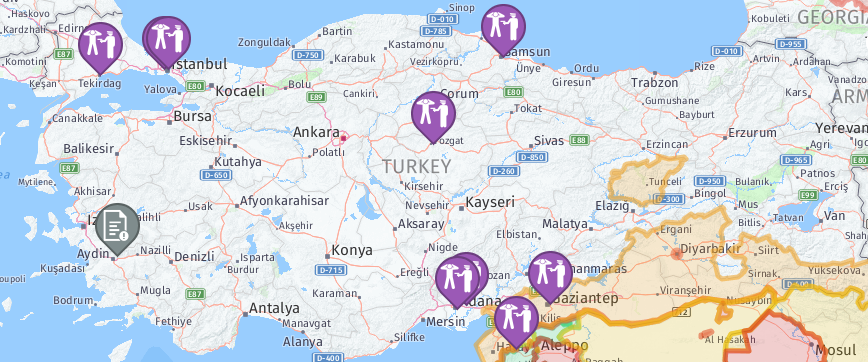

(Click on above image to expand)
Turkish Interior Minister, Süleyman Soylu, gave general information regarding operations against the IS in Turkey. He stated that 146 IS terrorists were killed during 838 operations in 2017 and that 10 potential IS attacks were prevented the same year. Aylin Sekizkök, the deputy director general for security and intelligence at the Ministry of Foreign Affairs, also stated that 54,000 IS suspects are not allowed to enter the country and 5,550 of them who have managed to enter Turkey have been deported. Overall 9,000 people, half of whom are foreign fighters, have been detained from 2014 to 2017.
‘54,000 IS suspects are not allowed to enter the country and 5,550 of them who have managed to enter Turkey have been deported’
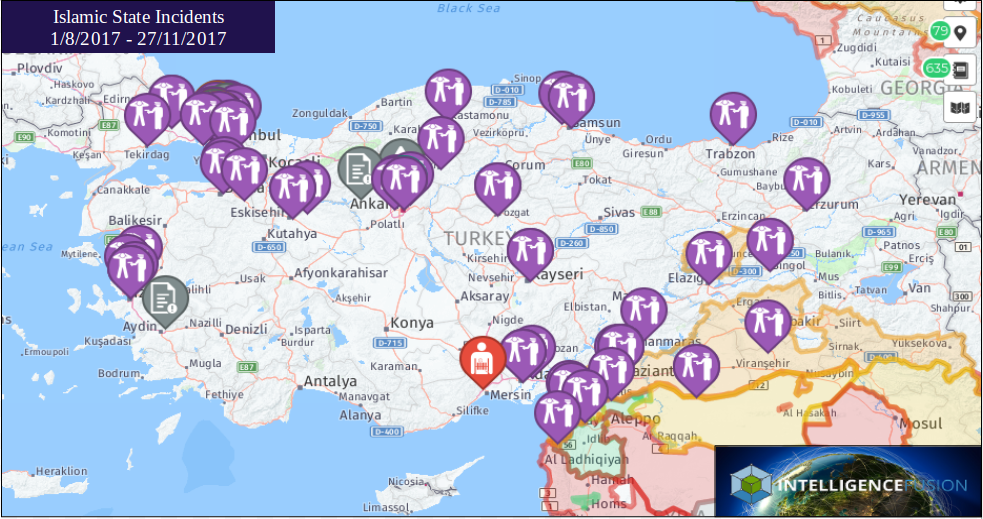

(Click on above image to expand)
Notable Incidents
20th November 2017
IS masterminds of terrorist attacks in Turkey among the ones evacuating Raqqa/Syria
Dokumaci Mustafa and Bali Ilhami, two IS militants accused of being the masterminds behind the deadly attacks in Diyarbakir, Suruç and Ankara, are suspected to have been among the hundreds of IS fighters evacuated from Raqqa/Syria. The evacuation took place after a deal between the Islamic State and the Syrian Democratic Forces (SDF) on 12th November.


The IS militants suspected of being among the IS members evacuated from Raqqa. Source:Turkish Police (Click on above image to expand)
From Raqqa to Idlib and then Turkey
On 12th November, nearly 4000 IS fighters, including their families, were safely evacuated from Raqqa/Syria after a deal was made between the IS, the SDF and coalition forces. A vehicle convoy loaded with IS fighters and part of their weapons left Raqqa , leaving it under the Syrian Defence Forces control. The precise locations the convoy passed through are not entirely known. According to Abu Musab Huthaifa, the IS intelligence chief who was in the convoy but is now caught and held prisoner at the Turkish-Syrian border, the convoy ended its route in the countryside of eastern Syria, close to the Iraqi border. But it was not a destination all IS fighters and their families reached. A number of them followed another route towards the Syrian-Turkish border. Human traffickers, active at the Syrian border, mentioned that there has been a significant number of families from Raqqa crossing the border into Turkey. Most of the families were foreign/non Syrian. The human smugglers also mentioned special networks used by prominent foreign IS fighters into Turkey – which most likely are more expensive, more reliable and more secure than the others available.
Idlib/Syria, bordering the Turkish Hatay Province, was another destination for the evacuated Raqqa IS fighters. With a much higher cost, starting from £3,000 per fighter, many IS members and their families found refuge in the northern, rebel-held province of Syria. Among them, many coming from Europe and Central Asia. From there, they also have the possibility to attempt a border crossing to Turkey. And many of them might have already done so. Ismail U. (23), IS militant active in Syria, was arrested by border security forces at the Reyhanlı district of Hatay. Further, The Turkish General Staff announced that 3,753 migrants were caught trying to enter Turkey from Syria between November 13 and 14. The identity of the detainees can not be verified – Turkish officials claim that they still have not received any biometric information regarding the previously Raqqa based IS fighters collected by their coalition counterparts – making it extremely difficult to know if and who of them were in Raqqa. These identity checks and interviews of suspected people are conducted prior to their entry in Turkey at 65 risk analysis units established at the Turkish-Syrian border. According to Aylin Sekizkök, the deputy director general for security and intelligence at the Turkish Ministry of Foreign Affairs, 10,000 people have been interviewed, and 4,000 of them have been deported up to today. In total, 54,000 IS suspects are not allowed to enter the country after security screenings, deportations and shared intelligence with foreign agencies. Further, border security measures include a concrete wall across the border line with Syria -near completion-, an installed electronic surveillance system as well as foot and vehicle patrols. Despite all the security measures taken, Turkey is a destination for IS fighters as it was for Abu Musab Huthaifa, the IS intelligence chief, who was abandoned by his human smugglers while navigating through hostile SDF territory on his way to Turkey, and later captured. Assuming that his smuggler was more reliable he would have entered Turkey undetected. The families and IS fighters who make it across the border use underground tunnels, rivers and any other path that is away from border security patrols. But the high risk comes from the economically capable, highly ranked and deeply networked IS members whose contacts are able to not only reassure their safe passage into the country but support their safe stay in Turkey and assist them in plotting against the country.
PKK/KCK
Summary
Turkish Army, Air and Ground forces, continued their operations against the PKK in the south eastern provinces. Foot patrols exchanged fire with PKK insurgents in areas of high altitude under difficult weather conditions. Several districts of ElazÄ±Ä and Tunceli were declared Special Security Zones with extensive security measures taken against PKK attacks. In Siirt and Diyarbakir curfews were imposed due to the counter terror operations carried out by special forces. The ground operations were supported by surveillance and armed drones, helicopters, and fighter jets which launched attacks against PKK hideouts. A large amount of weapons, explosives, IEDs and ammunition were found and seized during the operations. In total 692 PKK suspects were detained.
PKK Incidents – Country Wide
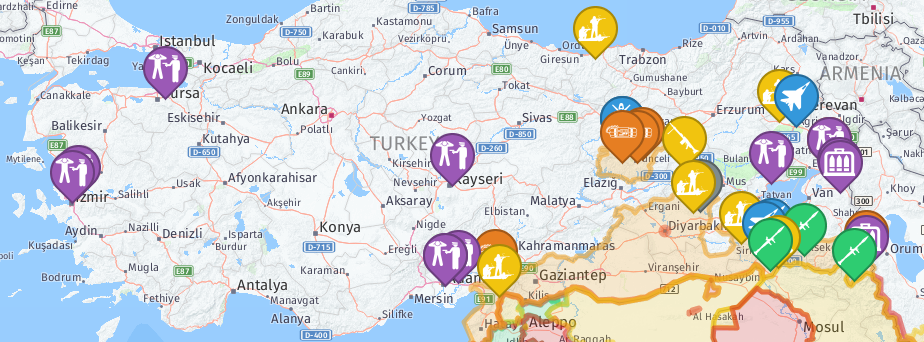

(Click on above image to expand)
PKK Incidents – Southeastern Turkey
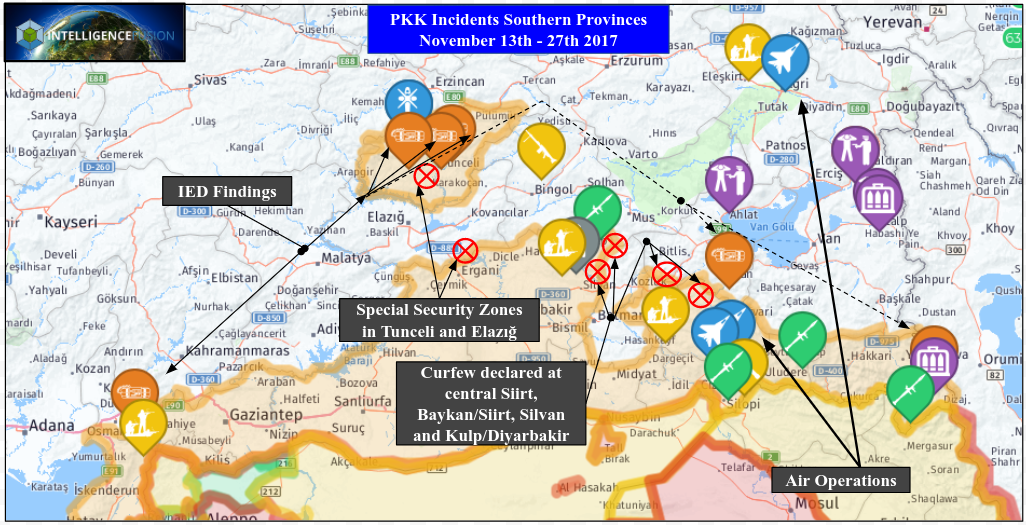

(Click on above image to expand)
A security operation is ongoing at the Bestler-Dereler region of Sirnak. During the operation many PKK insurgents have lost their lives, including high ranking PKK members. Turkish soldiers patrol on difficult terrain in the Gabar Mountain, stretching across the provinces of Sirnak, Siirt and Mardin.
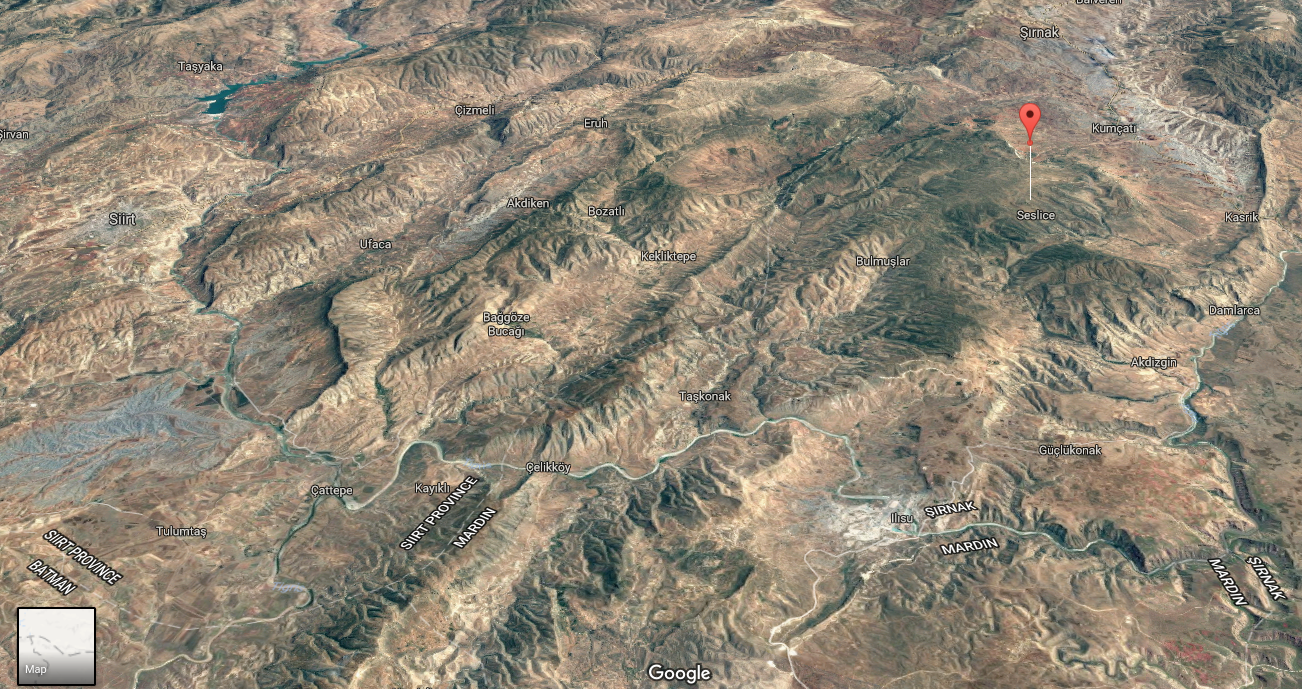
A view of Küpeli Mountain, also known as Gabbar Mountain, stretching across the provinces of Åırnak, Mardin and Siirt.
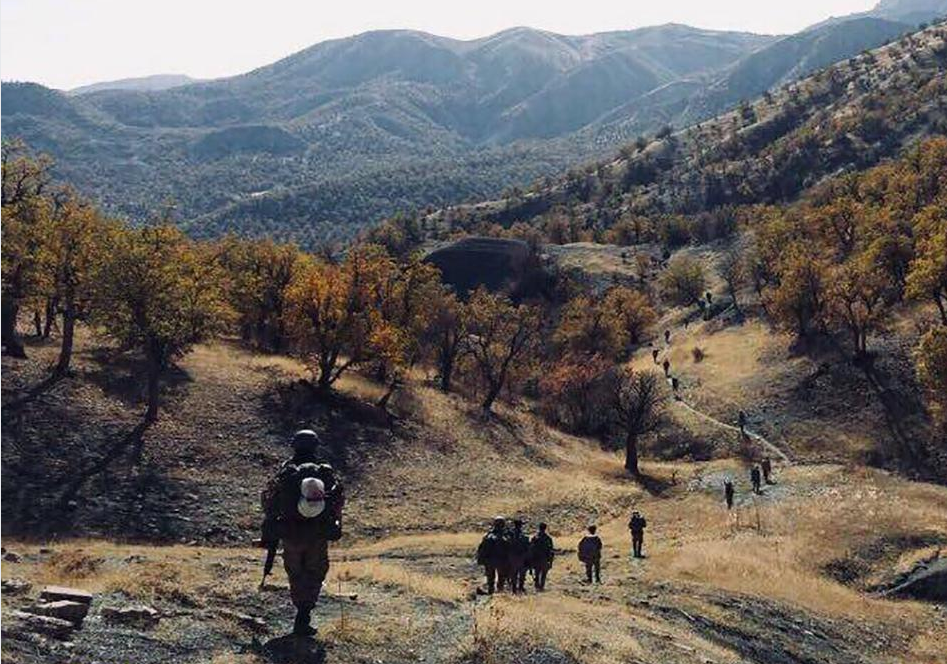
ÃakırsöÄüt Gendarmerie Brigade patrolling in Sirnak’s Bestler-Dereler region Source:Turkish Armed Forces.
FETÃ
Summary
Numerous operations were carried out throughout Turkey resulting to the detention of 1329 people accused of having links with FETÃ, both from the private and government sectors. Police authorities released information regarding the number of identified ByLock users in Ankara and the rest of Turkey, marking the future scope of operations against FETÃ networks. During an operation in Izmir it was revealed that FETÃ members had developed a new encrypted application to ensure the secrecy of their communications.
FETÃ Incidents
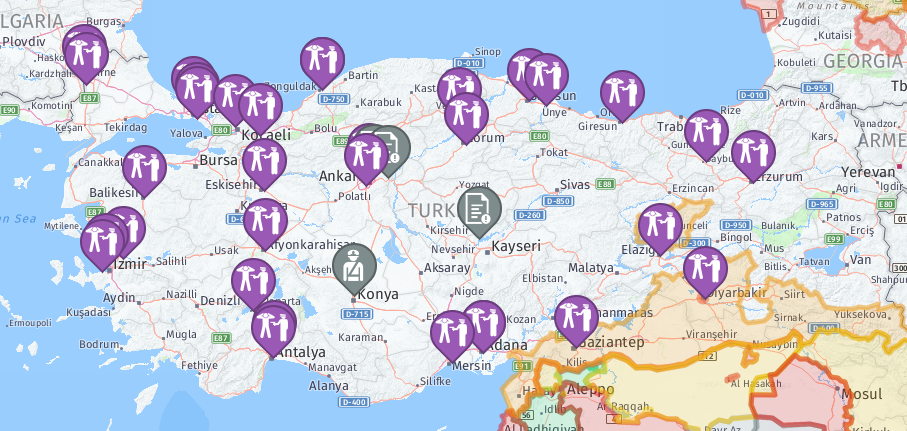

(Click on above image to expand)
COMMENT – Interior Minister Suleyman Soylu stated that nearly 49,000 people have been detained over links with FETÃ since the failed 15th July 2016 coup. Many of the detainees were civilians from the private sector but also from the government sector, including personnel from ministries and other state institutions. Some 25 percent of the Turkish Foreign Ministryâs staff has been suspended as they are investigated for their links with FETÃ. Additionally, a large number of specialized personnel and officers from the police and armed forces were either permanently removed from their posts or detained until the investigations over their links with FETÃ are completed. The future operations against FETÃ seem to not lack intensity. Police have identified around 215,000 ByLock users, with 15,000 of them detected in Ankara. ByLock is an encrypted instant messaging application used by FETÃ members. Legal proceedings have been initiated against 23,171 but due to workload of the judicial and security authorities the processing of all the remaining suspects requires a long period of time. Further, it was recently announced that some 400 military personnel will be dismissed from their duties. Until now, Security authorities have seen a decrease of their specialized and experienced personnel due to the persecutions and investigations of FETÃâs networks in government agencies. That has limited their operational capabilities and has put a strain on the remaining officers on duty. Even though 533 security personnel were returned to their duties on Nov. 16, after being suspended over links with FETÃ, they will most likely be placed in positions of low responsibility. As it is highly likely that such detentions will continue in the government sectors, state security organizations in Turkey will need recruitment and training programmes for new or low-ranked on-duty personnel to make up for the loss of experienced officers – COMMENT ENDS
Extreme Left Organisations
Summary
19 people were arrested accused of having links with extreme left organizations. 4 members of the Maoist Communist Party of Turkey (MKP) were killed in Ovacik/Tunceli during a counter terrorism operation by the Turkish Army. The Interior Minister Süleyman Soylu stated that 410 DHKP-C-linked suspects have been detained and 59 DHKP-C militants have been killed over the past year.
Turkish Military Operation in Idlib/Syria
Summary
Turkish troops in Idlib/Syria continued to establish security checkpoints and monitoring towers facing the Kurdish-held Afrin. The Turkish Armed Forces announced that their third post was established in Kafr Bassin village on Nov. 19. Military vehicles and Turkish soldiers moved across the Idlib-Afrin zone and were stationed north of Qabtan Al Jabal town. On November 20th, PYD launched five mortar attacks near the Daret Izzet Turkish observation point. As Russian and Syrian air operations targeted rebel positions at South-Western Idlib, the Iranian, Turkish and Russian leaders met in Sochi/Russia to discuss the future of a political settlement in Syria. The main point of objection by President Erdogan was the exclusion of the U.S. backed PYD in such a process. The three parties agreed on holding a Syrian national dialogue congress in Russia in December.
Idlib Operation Timeline


(Click on above image to expand)
COMMENT – President Trumpâs decision to stop the shipment of arms to YPG forces in Northern Syria was received with great satisfaction by Turkeyâs political leaders as it weakens YPG/PYD military capabilities and their future aspirations for independence at a time when Turkey, Iran and Russia seem to be the protagonists of a process which will form the post-war Syria. Trumpâs decision comes after previous statements of the U.S.-led coalition spokesman Col. Ryan Dillon that coalition forces will protect partners – such as the YPG- fighting the Islamic State. On a different occasion, U.S. Defense Secretary Jim Mattis said that âU.S. forces will not pull out from Syria until a political solution is achievedâ. On that basis we could interpret Trumpâs decision as a U.S. âpartial, indirect withdrawalâ from the Syrian War. Blocking the U.S. support to YPG, and preventing the long-term presence of U.S. troops in Syria are main objectives of the Iranian-Russian-Turkish alliance which until now hasn’t faced any difficulties in diminishing the U.S. role in Syria. After Trumpâs decision, one of their objectives seems to be achieved. Turkish military armored vehicles and troops are stationed at strategic locations in Idlib, overlooking the Syrian city of Afrin, awaiting an offensive that would massively empower Erdoganâs political rule and advance Turkeyâs interests in the Middle East. President Erdogan, Foreign Minister Mevlüt ÃavuÅoÄlu and Turkish Defence Minister Nurettin Canikli emphasized the threat the Kurdish-held Afrin poses for Turkeyâs national security during many political statements. Using a definitive language, they repeatedly stated that they will eliminate any terrorist element currently present in Northern Syria. Additionally, Turkish officials said that an offensive on the Democratic Union Party (PYD)-held Afrin may come soon. On the other hand, the military operations of the SAA around Idlib, backed by the Iranian and Russian air forces, are expected to intensify and a full-force attack against the rebels in Idlib seems to become increasingly probable. At that point, Turkey will need to respond to the situation and either withdraw from Idlib, risking a YPG advancement towards Idlib, or remain and engage in combat with both the rebels in Idlib and a probably weakened – but utterly determined to counter a Turkish offensive – YPG from the East (with or without U.S. support). Such a dual front means many Turkish casualties, simultaneous attacks at its south eastern provinces by PKK forces and retaliation attacks in Turkish cities by islamic extremist and PKK. That means that Turkey will need to decide between a possible expansion of YPG to the West, (a strategic failure since preventing YPG from expanding was the main objective of its deployment in Idlib) or having to deal multiple domestic and external fronts of YPG, PKK and well armed jihadi groups. Both scenarios will set Turkey in a prolonged state of instability and uncertainty due to its severely deteriorated domestic and external security conditions and set the grounds for future, long lasting hostilities with the PKK, YPG and jihadist groups – COMMENT ENDS
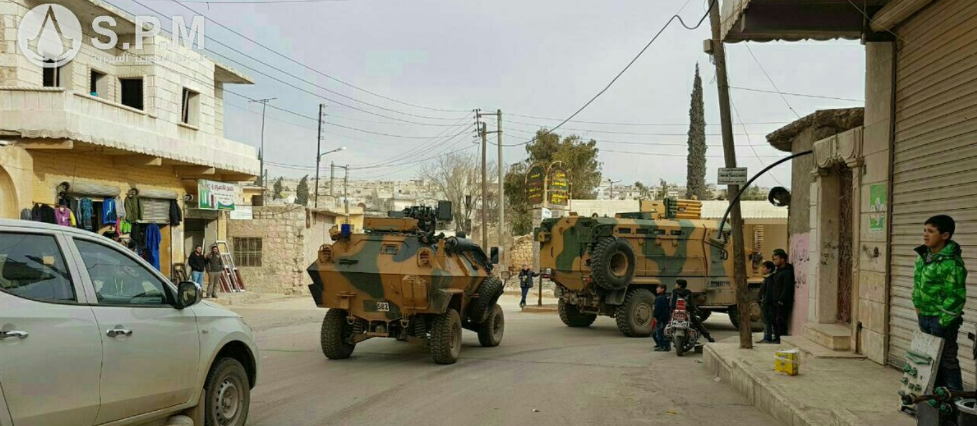
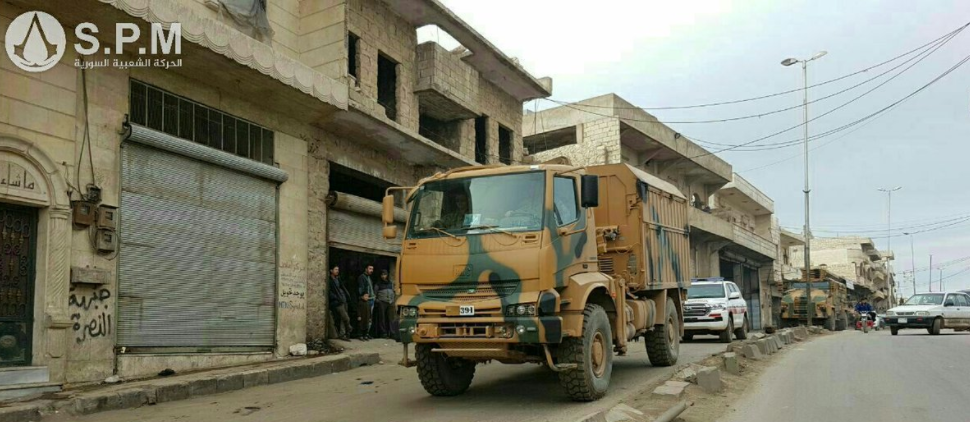
Turkish armored vehicles seen in Idlib/Syria, reportedly heading towards Sheikh Aqil mountain Source:S.P.M
Foreign Affairs
U.S./NATO – Turkey Relations
Summary
Turkeyâs relationship with NATO and the US continues to be unstable. Main reasons are the U.S. support to the Kurdish YPG forces in Syria (to be stopped after President Trumpâs recent promise to Erdogan), U.S. reluctance to extradite Fethullah Gülen (leader of the Gülen movement designated as a terrorist organization in Turkey), and Turkeyâs decision to buy the Russian S-400 missile defense system, not compatible with NATOâs equipment. Two recent events, the withdrawal of Turkish troops from a NATO exercise in Norway and the revelation of a secret deal between the mainly Kurdish SDF and the Islamic State infuriated Ankara and led to sharp statements from major Turkish political figures against the U.S. and NATO. In contrast to the general despise and sharp criticism against NATO, Turkish Foreign Minister, Mevlüt ÃavuÅoÄlu, denied that Turkey has been drifting away from Europe and NATO or that it is approaching Russia, and emphasized Turkeyâs current âmulti-dimensionalâ foreign policy. In a move that caught off guard both the Pentagon and the U.S. State Department, President Trump promised President Erdogan that U.S. will stop arming YPG in Syria during a phone communication they had on November 24th.
Incident I. 24/11/2017
U.S. stops arming the Syrian Kurds
U.S.President Donald Trump promised Turkish President Erdogan that the arm shipments to Syrian Kurds will stop. Turkish officials expressed their satisfaction over Trumpâs promise.
COMMENT – This decision will most likely improve the strained relations between U.S. and Turkey. Turkish efforts to counter the YPG forces in Syria are likely to be facilitated as YPG loses an important part of its arms supplies. The probability of Turkish military operations in YPG-held Syrian territory, most imminently at the city of Afrin, is raised especially in this period of time when Turkey is diplomatically highly active with Russia and Iran over the future of their operations in Syria. Trumpâs decision to disengage from YPG could be an indicator for an upcoming Turkish operation in Afrin, which Trump wants to avoid as it could draw the U.S in a military confrontation with Iran and Russia – COMMENT ENDS
Incident II. 22/11/2017
Turkey expects to receive its first Russian S-400 surface-to-air missiles in 2019
For the first time a more precise timeframe for the delivery of the Russian S-400 defence system was presented by the Turkish Defence Minister, Nurettin Canikli.
COMMENT – Turkeyâs western allies have been watching Turkeyâs steady and progressive commitment to engage in military cooperation with major Middle Eastern state actors. The purchase of the Russian S-400 defense system adds Russia to the developing axis of Turkeyâs non western allies and sets the ground for a further strategic cooperation with Russia on an economic and common defense basis. NATOâs concerns are increased not only because of the incompatibility of the S-400s with NATOâs military equipment but for the delivery of F-35 fighter jets in Turkey in 2018. Heidi Grant, deputy undersecretary of the U.S. Air Force for international affairs, said that the fifth-generation technology of the F-35 might be exposed to the Russians when the S-400 system and F-35 will be used together in Turkey, a contingency that will affect NATO members using F-35 aircrafts – COMMENT ENDS
Incident III. 17/11/2017
Turkey withdraws its troops from NATO military drill in Norway
Turkey withdrew 40 of its troops from the NATO military drill âTrident Javelinâ in Norway after a civilian Norwegian official depicted President Recep Tayyip ErdoÄan as an âenemy collaboratorâ and a portrait of Turkeyâs founder Mustafa Kemal Atatürk was displayed as a target during a computer-assisted exercise at NATOâs Joint Warfare Center in Stavanger, Norway. NATO Secretary-General Jens Stoltenberg apologized to Turkey in a written statement and to Turkish Chief of General Staff Gen. Hulusi Akar in a face-to-face meeting in Canada.
COMMENT – This incident caused a widespread political reaction in Turkey. President Erdogan talked about âvile peopleâ responsible for the incident and that attacks on Turkey are triggered by âTurkeyâs increasing powerâ. Turkish main opposition party leader, Kemal KılıçdaroÄlu, stated that the incident can not be just evaded with an apology, and the Nationalist Movement Party (MHP) leader, Devlet Bahçeli, took a harder stance stating that the incident in Norway is âa disgrace that cannot be fixed or compensatedâ and that âIt is necessary for Turkey to question NATOââ. Indicative of the tension between Turkey and NATO is the fact that such minor incidents are magnified and used to their full extent to severely criticize NATOâs role and at times question the necessity of Turkeyâs membership. Both EU and U.S. are often included in this criticism marking Turkeyâs deviation from its western oriented foreign policy and the deepening of its troubled relation with the west – COMMENT ENDS
Incident IV. 15/11/2017
Turkish Foreign Ministry criticizes the IS-SDF deal for the safe evacuation of IS fighters from Raqqa/Syria
The Turkish Foreign Ministry described the IS-SDF deal, approved by the coalition forces, as an âextremely grave and eye-opening revelationâ. It claimed that the main objective of the YPG/SDF objective is not to fight terrorism but to occupy Syrian territories and, expressed its strong disapproval of the U.S. coalitionâs acceptance of the deal. Pentagon spokesman Eric Pahon described the deal as a âlocal solution to a local issue.â
COMMENT – Turkeyâs severe criticism is not only based on the potential threat the fleeing IS fighters from Raqqa pose for Turkeyâs domestic security. It mainly opposes the fact that YPG benefits from the U.S. intervention in the Syrian Civil War, in this case YPG expanding its territorial control in Syria. Turkey opposes also to the intended long term presence of U.S. forces in Syria. The U.S. Defense Secretary Jim Mattis stated âU.S. will not pull out from Syria before there was progress towards a political solutionâ, a statement warmly welcomed by the main Syrian Kurdish political party, the PYD, but strongly condemned by Turkey. Turkish political figures of the highest rank repeatedly attempt to target U.S. as an actor of instability in the region and connect the U.S support given to YPG to the threat YPG poses for Turkey. Turkish Foreign Minister, Mevlüt ÃavuÅoÄlu, stated that “We are going to share soon the photos and evidence showing weapons that the U.S. has been giving to YPGââ. As long as U.S. prolongs its support for YPG it is expected that more similar incidents between the two states will occur. Turkish/U.S. relations will further deteriorate as Turkey will need to move towards other alliances and find alternative military partners to counter the PKK-affiliated YPG threat – COMMENT ENDS
Human Trafficking
Summary
Most of the human trafficking incidents were recorded at Turkeyâs western coastline in the cities of Izmir and Bodrum mainly due to the winter weather conditions which have reached Northern Turkey. At the border with Syria, 3,753 migrants were caught trying to enter Turkey from Syria between Nov. 13 and 14.
Human Trafficking Incidents
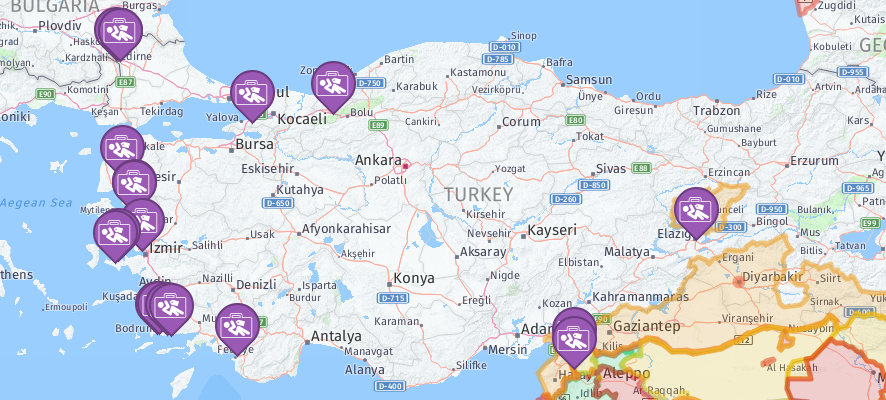

(Click on above image to expand)
Incident I. 13/11/2017
The Turkish General Staff announced that 3,753 migrants were caught trying to enter Turkey illegally from Syria between Nov. 13 and 14.
COMMENT – Human smugglers operating on the Syrian side of the Turkish-Syrian border have said that they charge $1,500 for a family wishing to cross the border into Turkey and $600 for a single person. Crossing into Turkey has become more challenging as alternative routes and more dangerous paths have to be used due to a Turkish concrete wall being built across the border line with Syria. It is reported that most of the wall has been completed. Monitor towers, barbed wire, surveillance cameras and on-foot and vehicle patrols are set along the wall made by concrete blocks of 3 meters length and 4 meters height – COMMENT ENDS
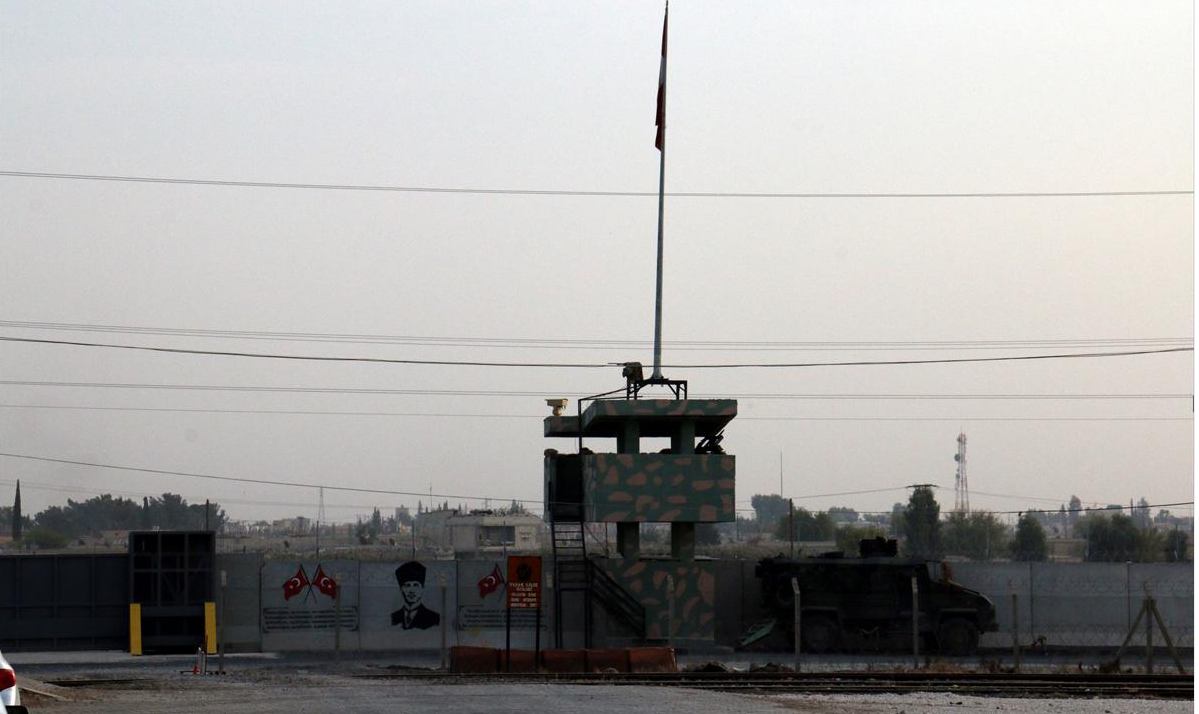
A monitor tower and a patrol vehicle at a completed part of the border wall.
Source: CNN Türk
Narcotics
Summary
Heavy loads of heroin were seized in the south eastern provinces of Van, Åırnak, Osmaniye, and in Ankara. Large scale counter narcotics operations were held in Adana, Bursa and Istanbul resulting to numerous arrests of drug traffickers and thousands of drug pills were seized during operations in the Ãankırı and Samsun provinces. In Adana, Amasya and Istanbul, thousands of illicit alcohol bottles were seized.
Narcotics Incidents – Country Wide
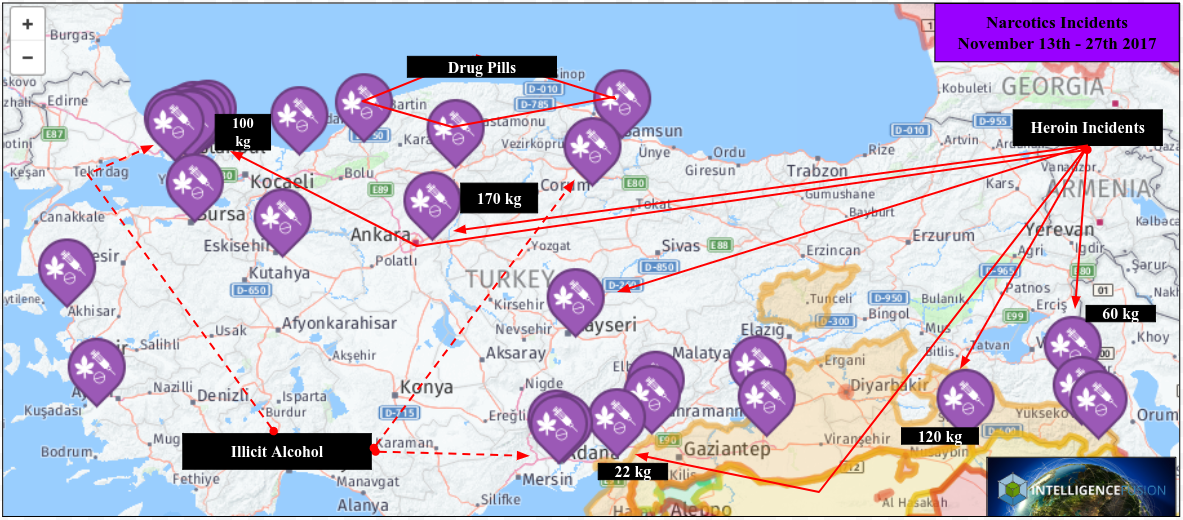

(Click on above image to expand)
Incident I. 21/11/2017
120 thousand bottles of illicit alcohol were seized during raids in 20 addresses in Istanbul.
The amount of alcohol seized is the largest in a single operation carried out in Istanbul so far. During operations following the incident, 25 people were arrested and held responsible for producing and trading the illicit alcohol in restaurants and night clubs.
COMMENT -The alcohol drinks produced without proper quality control pose a serious health risk to consumers and could even cause death. Traditionally, many people produce their own alcohol drinks, such as Raki, but it is of limited quantity and it is usually consumed by the family, relative, friends and guests. Businessmen involved in the Food and Bar & Nightclub industry are mostly the ones interested in purchasing large quantities of unregulated alcohol products which they offer to their clients. High taxes of legal alcohol products and a competitive market are two reasons which turn them to the illicit alcohol market – COMMENT ENDS
Istanbul Narcotics Incidents
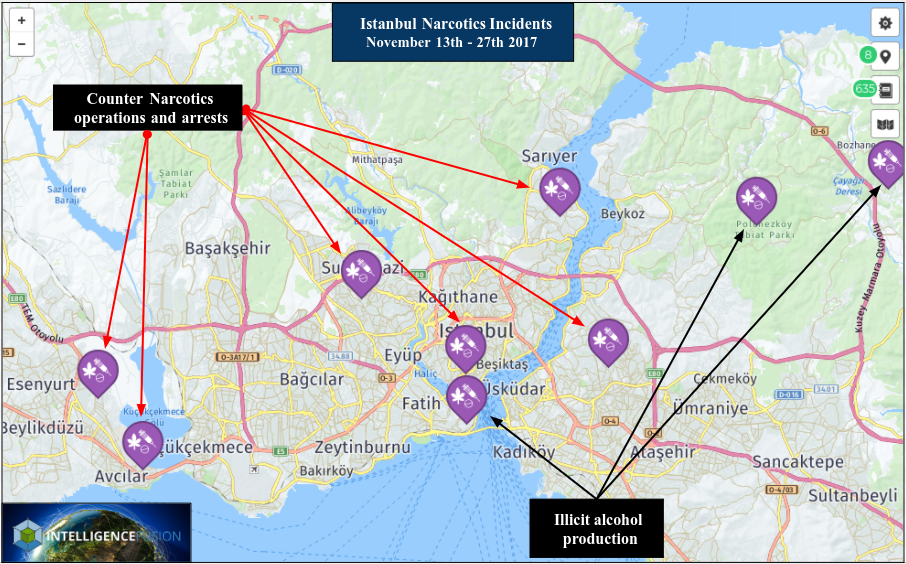

(Click on above image to expand)
Incident II. 15/11/2017
The United Nations Office on Drug and Crime (UNODC) reported an 87 per cent increase of opium production in Afghanistan compared to 2016.
COMMENT -Due to that increase, it is highly likely that heroin trafficking in Turkey via Iran will increase the following months as Turkey is the main route used by heroin traffickers to reach the Balkan states and Europe. Incidents of drug traffickers attempting to smuggle heavy loads of heroin occur on a regular basis in Turkey, especially in the cities of BaÅkale, Ãzalp, ErciÅ, and Central Van of the Van Province bordering Iran – COMMENT ENDS
Heroin Incidents September 1st – 27th November 2017
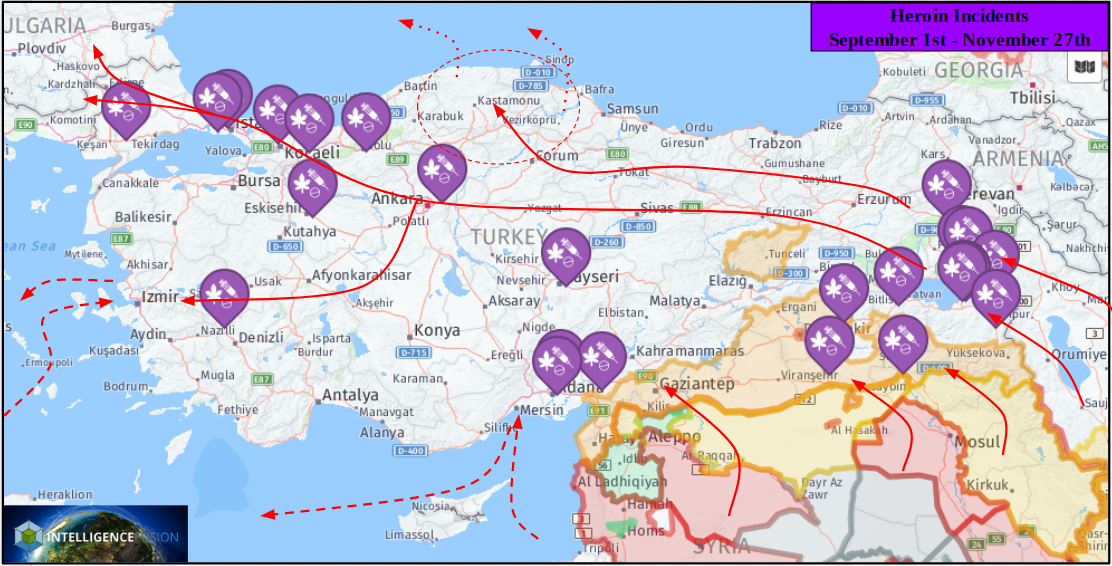

(Click on above image to expand)
Armed Incidents/Weapons Trafficking – Murders/Assaults
Summary
Armed Incidents were recorded on a daily basis in the past two weeks. Pistols and hunting rifles were fired with many people being injured and some of them dying even before any medical help could arrive. The weapons were used during verbal debates which escalated to armed fights between groups of people. A few people were shot while walking alone and others were injured when people inside passing vehicles opened fired on them. In most of the incidents, armored vehicles and special police forces were dispatched to the scene, securing the area and conducting investigations to arrest the ones involved in the shootings.
Armed Incidents/Murders/Assaults
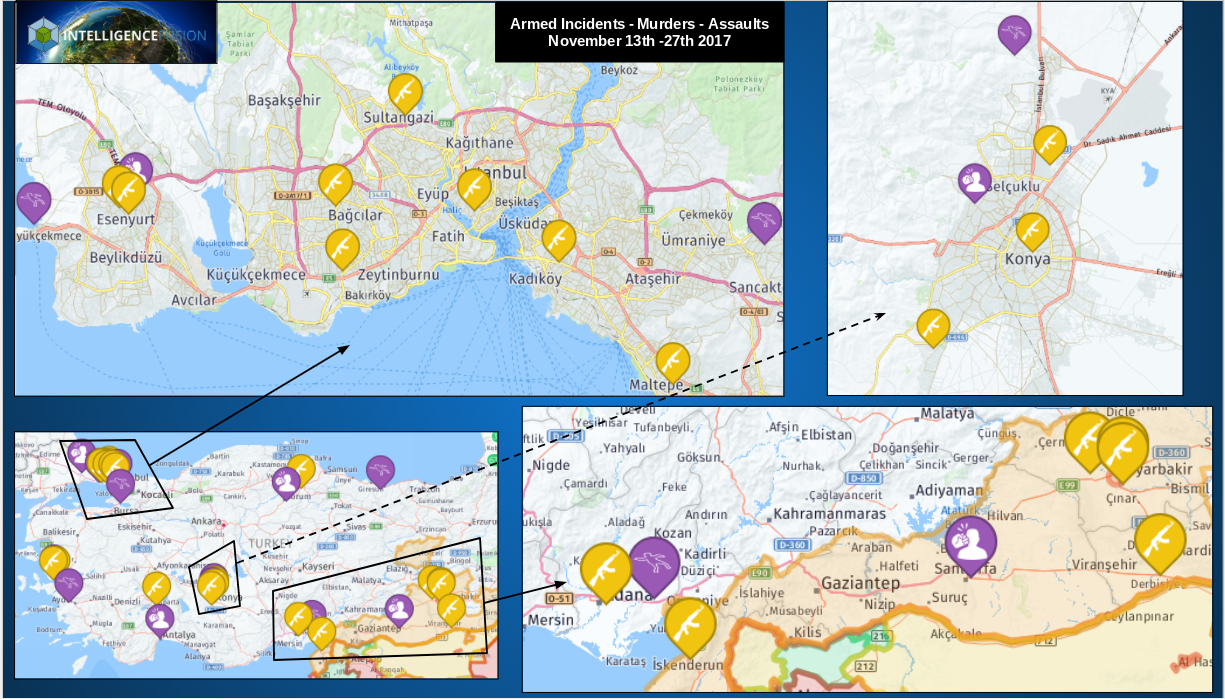

(Click on above image to expand)
COMMENT – It was reported that 2,000 security guards will be employed in the districts of Istanbul to provide additional security to markets and neighborhoods. Even though the increased presence of people trained to deal with public order issues is a positive step towards a more secure social environment, it is highly likely that armed incidents will continue occurring in the same frequency as long as the weapons trafficking/trading remain unregulated and the possession of unregistered firearms is not strictly persecuted by law- COMMENT ENDS
Weapons Trafficking Incidents
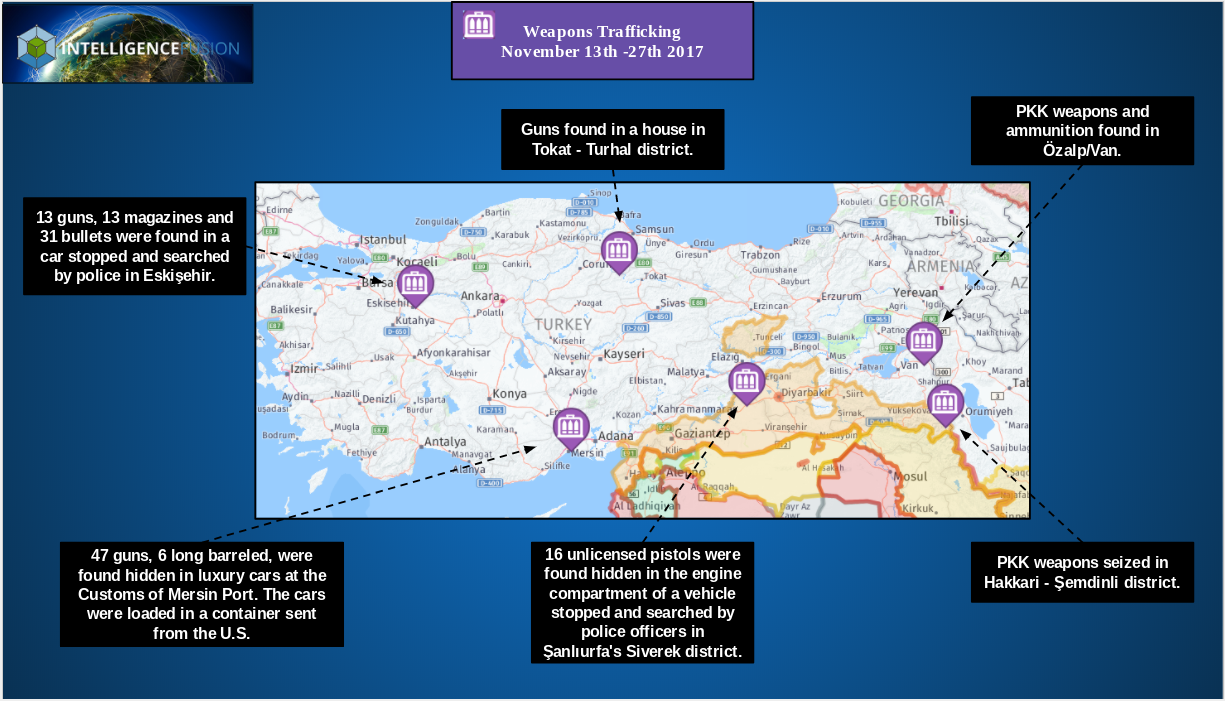

(Click on above image to expand)
References
Department of Foreign Affairs and Trade, Australia,Canberra. 2017. Turkey. http://smartraveller.gov.au/countries/europe/southern/pages/turkey.aspx
Foreign and Commonwealth Office 2017, UK. Turkey. https://www.gov.uk/foreign-travel-advice/turkey
McCabe, M. & Harrington, D. 2017. Intelligence Fusion Platform [Online]. London: Ambix. Available: https://www.intelligencefusion.co.uk
Ministry of Interior. Republic of Turkey. November 2017, https://www.icisleri.gov.tr/
Panagiotis Vasilias, September 10, 2017, Islamic State Threat to Turkey, Intelligence Fusion, https://www.intelligencefusion.co.uk/single-post/2017/09/10/Islamic-State-Threat-to-Turkey
Turkish armed forces, November 2017, http://www.tsk.tr/YurticiOlaylar
UN News Center, 15 November 2017, Afghanistan opium production jumps 87 per cent to record level â UN survey, http://www.un.org/apps/news/story.asp?NewsID=58093#.WhlaMdWnHrc